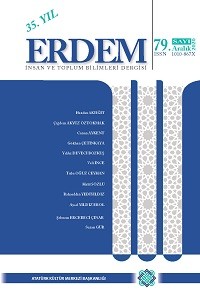Abstract
İslam terimi hem jeopolitik konuşlanmayı hem de en büyük üç tek
Tanrılı dinin en gencinin sosyal ve manevi içeriklerini kapsar. Yedinci
yüzyılın ilk yarısında Arabistan'da ortaya çıkan İslam, ihtida, kültürel
cazibe ve fetih yoluyla yayıldı. Bazıları tarafından hala bilinmiyor
olsa da, günümüzde dünyanın en canlı sistemlerinden biridir. Bu
makale, 20. yüzyılın ünlü Fransız sosyal bilimcisi Jacques Berque’in
ölümünden bir hafta önce Avrupa ve Arap Dünyası ile İslâm ve Batı
ilişkileri hakkında yapmış olduğu tarihî ve sosyolojik bir tahlildir.
Berque burada yoğun ve özlü bir anlatımla İslam’ın coğrafî ve
beşerî konumuna, kültürel farklılıklarına, diğer bir ifadeyle bu köklü
medeniyetin çağınızdaki farklılaşmış uzantılarına dikkat çekiyor.
İslam ülkeleri arasında gerçekleştirilen uluslararası toplantılarda, İslam
medeniyetinin temel sorunlarının tartışılmasından daha çok yerel ve
geçici bazı meseleler üzerinde durulmakla yetinildiğini vurgulayan
Berque, çağımızda İslam’ın asıl meselelerini küresel kapsamda ele
alıyor. Ona göre, Ortaçağda İslam Batı tarafından, mesela bir Pierre
Abélard (1079-1142), bir Ramon Lull (1235-1315) tarafından daha
iyi anlaşılmıştı. Batı’nın İslam ve Çin gibi oluşumlara karşı tutumu,
Sanayi Devrimi’nden sonra değişti. Kibir ve egemenlik mantığı hâkim
oldu. Emperyalizm ya da “sanayi devriminin genişlemesi”, halklar ve
kültürler arasındaki değişim mekanizmasını bozdu. İslam, iki veya üç
asırdan bu yana, geçmişte kendisinin de kullandığı Batı rasyonalitesini
işletmeyi sürdüremedi. İbn Rüşt ya da İbn Haldun’un çok verimli
düşünceleri takipçilerini bulamadı. Bu büyük medeniyet mekanik
performanslardan mahrum kaldı. “Takip hastalığına” tutuldu, taklitten
başı döndü. Batı ile ilişkileri, “burukluk ve ötekilik” temeli üzerine
oturdu. Batı bugün İslam’a tamamen olumsuz yaklaşıyor. Japonya’yı
ayıplamıyor, ondan korkuyor. Ona göre, Çin kullanılacak harika bir
müşteri… Hindistan’ın “metafizik eğilimi” bu devi “zararsız” kılıyor.
Müslüman’a gelince, o “ebedi bir Sarazen’dir. En kötü bir modernlikle
daha tehlikeli olabilir. Batı, İslam’ı üç konuda suçluyor: “Bazen
terörizme varan bir saldırganlık; din görevlisini siyasette kullanma
eğilimi; İnsan haklarına saygı konusunda isteksizlik… Bugün kadın
hakları bunun en kesin ölçütüdür”. Berque, bunların sebeplerini
anlatarak cevaplarını veriyor. İslam’da bu sorunları gözlemlemenin,
Batı tarihinin yıkımlarını unutturamayacağını belirtiyor ve
“örosantrizmden/Avrupa merkezciliğinden” sakınılmasını tavsiye
ediyor. Berque’e göre, İslam, maneviyatının bir kısmını kaybetmeye
başlamıştır. Müslümanların çoğu, İslam’ı yabancı kumpaslara,
rejimlerin başarısızlığına ve insanların kötülüğüne karşı bir sığınak
olarak görüyor. Bu rol, manevî rolün önüne geçmiştir. Demokrasi
mahkûm edilmiştir. Bazı grupların bu tutumu, Müslüman toplumların
tümünün bağnazlık ve hoşgörüsüzlükle suçlanmalarına sebep olmuştur.
Bu toptancı suçlamalar tamamen «haksız”dır. Ancak bugünün İslam’ı
kitleleri tatmin etmiyor. Özgünlüğünü koruyan ve dünyanın gidişatına
ayak uyduran bir “gelişme İslam’ı”, dinamik bir İslam inşa etmek
gerekiyor.
References
- Berque, Jacques (1980), L’Islam au défi, Paris: Gallimard.
- Berque, Jacques (1995), Le Coran, essai de traduction, Paris: Albin Michel.
- Burgat, François (1988), L’islamisme au Maghreb, la voie du Sud, Paris: Karthala.
- Chérif, Mustapha (1990), Culture et politique au Maghreb, Alger: Maghreb- Relation, Sd.
- Gardet, Louis (1982), L’islam, religion et communauté, Paris, Desclée de Brouwer.
- “Hilaf Allah (1992), “Hakku’l-İhtilâf fî’l-mefhûmi’l-İslâmî” [İslami tasarımda ayrışma hakkı], el-Kâhira Dergisi, Kahire,1992.
- Malek, Rédha (1993), Tradition et révolution, l’enjeu de la modernité en Algérie et dans l’Islam, Paris: Sindbad.
- Sellam, Sadek (1990), Etre musulman aujourd’hui, Paris, Nouvelle Cité, Rencontres.
- Talbî, Mohamed ve Dr. Bucaille (1989), Réflexions sur le Coran, Paris, Seghers.
Abstract
References
- Berque, Jacques (1980), L’Islam au défi, Paris: Gallimard.
- Berque, Jacques (1995), Le Coran, essai de traduction, Paris: Albin Michel.
- Burgat, François (1988), L’islamisme au Maghreb, la voie du Sud, Paris: Karthala.
- Chérif, Mustapha (1990), Culture et politique au Maghreb, Alger: Maghreb- Relation, Sd.
- Gardet, Louis (1982), L’islam, religion et communauté, Paris, Desclée de Brouwer.
- “Hilaf Allah (1992), “Hakku’l-İhtilâf fî’l-mefhûmi’l-İslâmî” [İslami tasarımda ayrışma hakkı], el-Kâhira Dergisi, Kahire,1992.
- Malek, Rédha (1993), Tradition et révolution, l’enjeu de la modernité en Algérie et dans l’Islam, Paris: Sindbad.
- Sellam, Sadek (1990), Etre musulman aujourd’hui, Paris, Nouvelle Cité, Rencontres.
- Talbî, Mohamed ve Dr. Bucaille (1989), Réflexions sur le Coran, Paris, Seghers.
Details
| Primary Language | Turkish |
|---|---|
| Journal Section | Erdem |
| Translators |
Bahaeddin Yediyıldız This is me |
| Publication Date | December 21, 2020 |
| Published in Issue | Year 2020 Issue: 79 |
ERDEM Journal is indexed by TR Dizin, MLA International Bibliography, EBSCOhost, SOBIAD, ASI (Advanced Science Index) ISAM, DAVET and AYK Journal Index.


